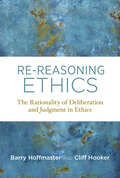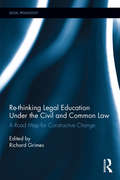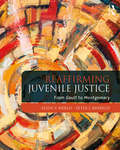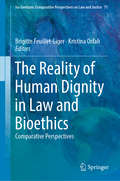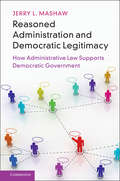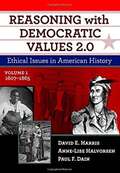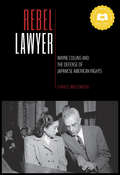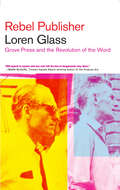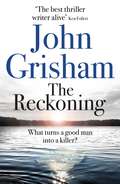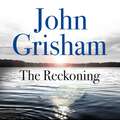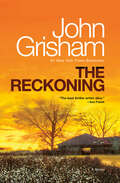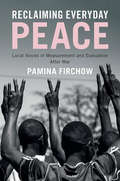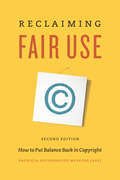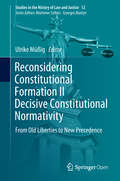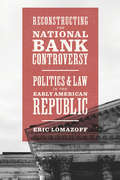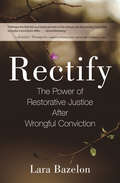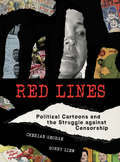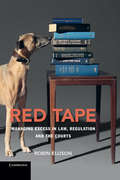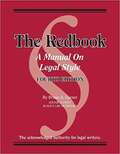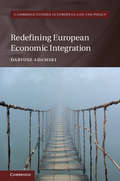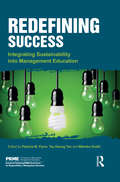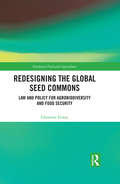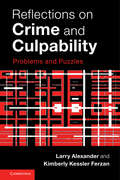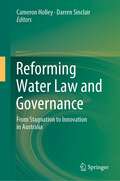- Table View
- List View
Re-Reasoning Ethics: The Rationality of Deliberation and Judgment in Ethics (Basic Bioethics)
by Barry Hoffmaster Cliff HookerHow developing a more expansive, non-formal conception of reason produces richer ethical understandings of human situations, explored and illustrated with many real examples.In Re-Reasoning Ethics, Barry Hoffmaster and Cliff Hooker enhance and empower ethics by adopting a non-formal paradigm of rational deliberation as intelligent problem-solving and a complementary non-formal paradigm of ethical deliberation as problem-solving design to promote human flourishing. The non-formal conception of reason produces broader and richer ethical understandings of human situations, not the simple, constrained depictions provided by moral theories and their logical applications in medical ethics and bioethics. Instead, it delivers and vindicates the moral judgment that complex, contextual, and dynamic situations require.Hoffmaster and Hooker demonstrate how this more expansive rationality operates with examples, first in science and then in ethics. Non-formal reason brings rationality not just to the empirical world of science but also to the empirical realities of human lives. Among the many real cases they present is that of how women at risk of having children with genetic conditions decide whether to try to become pregnant. These women do not apply the formal principle of maximizing expected utility (as advised by genetic counselors) and instead imagine scenarios of what their lives could be like with an affected child and assess whether they could accept the worst of these scenarios.Hoffmaster and Hooker explain how moral compromise and a liberated, extended, and enriched reflective equilibrium expand and augment rational ethical deliberation and how that deliberation can rationally design ethical practices, institutions, and policies.
Re-thinking Legal Education under the Civil and Common Law: A Road Map for Constructive Change (Legal Pedagogy)
by Richard GrimesWhilst educational theory has developed significantly in recent years, much of the law curriculum remains content-driven and delivered traditionally, predominantly through lecture format. Students are, in the main, treated as empty vessels to be filled by the eminent academics of the day. Re-thinking Legal Education under the Common and Civil Law draws on the experience of teachers, practitioners and students across the world who are committed to developing a more effective learning process. Little attention has, historically, been paid to the importance of the application of theory, the role of reflective learning, the understanding and acquisition of lawyering skills and the development of professional responsibility and wider ethical values. With contributions from across the global north and south, this book examines the history of educating our lawyers, the influences and constraints that may shape the curriculum, the means of delivering it and the models that could be used to tackle current shortcomings. The whole is intended to represent what might be desirable and possible if we are to produce lawyers that are fit for purpose in the 21st century, be that in either in civil or common law jurisdictions. This book will be of direct assistance to those who wish to understand the theory and practice of legal pedagogy in an experiential context. It will be essential reading for academics, researchers and teachers in the fields of law and education, particularly those concerned with curriculum design and developing interactive teaching methods. It is likely to be of interest to law students too – particularly those who value a more direct engagement in their learning.
Reaffirming Juvenile Justice: From Gault to Montgomery
by Alida V. Merlo Peter J. BenekosThis book will expand students’ knowledge and understanding of the evolution of juvenile justice in the last 50 years. Designed to coincide with the 50th anniversary of the landmark case In re Gault, which the U.S. Supreme Court decided in 1967, the authors provide a brief history of juvenile justice, then frame the developments and transformations that have occurred in the intervening years. Topics covered include an overview of the dramatic changes to the field following the spike in youth violence in the 1990s, the "superpredator" myth, zero-tolerance policies, and sanctions for juvenile offenders—particularly the 2005 abolition of the death penalty and subsequent decision on life without parole. The book also covers child and youth victimization and trauma, and recent prevention and treatment initiatives. Designed for upper-level undergraduates, this text reflects on the evolving U.S. juvenile justice system while anticipating future challenges and trends. Reaffirming Juvenile Justice illustrates how ideology, media, and politics shape policy and how it can evolve.
The Reality of Human Dignity in Law and Bioethics: Comparative Perspectives (Ius Gentium: Comparative Perspectives on Law and Justice #71)
by Brigitte Feuillet-Liger Kristina OrfaliAdopting an interdisciplinary perspective, this volume explores the reality of the principle of human dignity – a core value which is increasingly invoked in our societies and legal systems. This book provides a systematic overview of the legal and philosophical concept in sixteen countries representing different cultural and religious contexts and examines in particular its use in a developing case law (including of the European Court of Human Rights and of the Inter-American Court of Human Rights). Whilst omnipresent in the context of bioethics, this book reveals its wider use in healthcare more generally, treatment of prisoners, education, employment, and matters of life and death in many countries. In this unique comparative work, contributing authors share a multidisciplinary analysis of the use (and potential misuse) of the principle of dignity in Europe, Africa, South and North America and Asia. By revealing the ambivalence of human dignity in a wide range of cultures and contexts and through the evolving reality of case law, this book is a valuable resource for students, scholars and professionals working in bioethics, medicine, social sciences and law. Ultimately, it will make all those who invoke the principle of human dignity more aware of its multi-layered character and force us all to reflect on its ability to further social justice within our societies.
Reasoned Administration and Democratic Legitimacy: How Administrative Law Supports Democratic Government
by Jerry L. MashawReasoned Administration and Democratic Legitimacy: How Administrative Law Supports Democratic Government explores the fundamental bases for the legitimacy of the modern administrative state. While some have argued that modern administrative states are a threat to liberty and at war with democratic governance, Jerry L. Mashaw demonstrates that in fact reasoned administration is more respectful of rights and equal citizenship and truer to democratic values than lawmaking by either courts or legislatures. His account features the law's demand for reason giving and reasonableness as the crucial criterion for the legality of administrative action. In an argument combining history, sociology, political theory and law, this book demonstrates how administrative law's demand for reasoned administration structures administrative decision-making, empowers actors within and outside the government, and supports a complex vision of democratic self-rule.
Reasoning With Democratic Values 2. 0: Ethical Issues In American History, Volume 1: 1607-1865
by David E. Harris Anne-Lise Halvorsen Paul F. DainNow thoroughly updated and extensively revised for use in today’s history classrooms, this time-honored classic has never been more important than right now. <p><p>The new edition, Reasoning with Democratic Values2.0, presents an engaging approach to teaching U.S. history that promotes critical thinking and social responsibility. <p><p>In Volume 1 students investigate 20 significant historical episodes, arranged chronologically, beginning with the colonial era and ending with Reconstruction. Each carefully researched story examines an ethical decision made by an individual or group from the American past, and is guaranteed to excite students’ imaginations and spark lively classroom discussions involving core values of American democracy—liberty, equality, life, property, truth, and diversity. <p><p>The discussions aim to develop more mature moral reasoning by students while deepening their knowledge of American history. Each chapter contains five types of learning activities: Facts of the Case, Historical Understanding, Expressing Your Reasoning, Key Concepts from History, and Historical Inquiry. <p><p> In Volume 1, students can grapple with such ethical dilemmas as: <p> Should the Commonwealth of Massachusetts have granted reparation to the enslaved woman, Belinda Royall? <p>Should Thomas Jefferson have freed his slaves? <p>Should Juan Seguín have fought against the United States in the Mexican–American War? <p>Should Robert E. Lee have accepted command of the Union Army? <p><p>You can also purchase a comprehensive Instructor’s Manual that includes the rationale for the teaching approach, guidance for selecting chapters, direction for leading classroom discussions of ethical issues, suggestions for assessment and grading, answers for the learning activities, and more! <p><p> PROFESSIONAL DEVELOPMENT: The authors are available, at no fee, to conduct professional development programs for teachers and/or administrators regarding teaching with RDV 2.0. Visit www.rdv2.org for more details, including author contact information. The authors have committed their royalties to teacher education.
Rebel Lawyer: Wayne Collins and the Defense of Japanese American Rights
by Charles WollenbergWinner of the 2017 California Historical Society Book Award! Fred Korematsu, Iva Toguri (alias Tokyo Rose), Japanese Peruvians, and five thousand Americans who renounced their citizenship under duress: Rebel Lawyer tells the story of the key cases pertaining to the World War II incarceration of 120,000 people of Japanese ancestry and the trial attorney who defended them. Wayne Collins made a somewhat unlikely hero. An Irish American lawyer with a volatile temper, Collins’s passionate commitment to the nation’s constitutional principles put him in opposition to not only the United States government but also groups that acquiesced to internment such as the national office of the ACLU and the leadership of the Japanese American Citizens League. Through careful research and legal analysis, Charles Wollenberg takes readers through each case, and offers readers an understanding of how Collins came to be the most effective defender of the rights and liberties of the West Coast’s Japanese and Japanese American population. Wollenberg portrays Collins not as a white knight but as a tough, sometimes difficult man whose battles gave people of Japanese descent the foundation on which to construct their own powerful campaigns for redress.
Rebel Publisher: Grove Press and the Revolution of the Word
by Loren GlassHow Grove Press ended censorship of the printed word in America.Grove Press and its house journal, The Evergreen Review, revolutionized the publishing industry and radicalized the reading habits of the "paperback generation." In telling this story, Rebel Publisher offers a new window onto the long 1960s, from 1951, when Barney Rosset purchased the fledgling press for $3,000, to 1970, when the multimedia corporation into which he had built the company was crippled by a strike and feminist takeover. Grove Press was not only one of the entities responsible for ending censorship of the printed word in the United States but also for bringing avant-garde literature, especially drama, into the cultural mainstream. Much of this happened thanks to Rosset, whose charismatic leadership was crucial to Grove's success. With chapters covering world literature and the Latin American boom; experimental drama such as the Theater of the Absurd, the Living Theater, and the political epics of Bertolt Brecht; pornography and obscenity, including the landmark publication of the complete work of the Marquis de Sade; revolutionary writing, featuring Rosset's daring pursuit of the Bolivian journals of Che Guevara; and underground film, including the innovative development of the pocket filmscript, Loren Glass covers the full spectrum of Grove's remarkable achievement as a communications center for the counterculture.
The Reckoning: The Sunday Times Number One Bestseller
by John Grisham'I couldn't help thinking of Harper Lee's great American novel To Kill a Mockingbird while reading The Reckoning . . . [Grisham] knows how to spin a yarn' - Chicago Sun-Times'May be his greatest work yet' - David Grann, New York Times bestselling author of Killers of the Flower Moon?Pete Banning was Clanton's favourite son, a returning war hero, the patriarch of a prominent family; a farmer, father, and a faithful member of the Methodist Church. Then one cool October morning in 1946, he rose early, drove into town, walked into the Church, and calmly shot and killed the Reverend Dexter Bell.As if the murder wasn't shocking enough, it was even more baffling that Pete's only statement about it - to the sheriff, to his defense attorney, to the judge, to his family and friends, and to the people of Clanton - was 'I have nothing to say'.What turned Pete from a pillar of the community into cold-hearted killer? And why won't he confide in anyone? All his closest family knows is that it must have been something devastating - and that the fallout will haunt them, and the town, for decades to come . . .Further praise for The Reckoning'Beautifully constructed . . . weaves a truly magical spell' - Daily Mail'In this saga of love and war, John Grisham has given us a sprawling and engrossing story about a southern family, a global conflict, and the kinds of secrets that can shape all of us. From the courtrooms and jails of rural Mississippi to the war-torn Pacific, Grisham spins a tale that is at once entertaining and illuminating' - Jon Meacham, New York Times bestselling author of The Soul of America'John Grisham is the master of legal fiction, and his latest starts with a literal bang - and then travels backward through the horrors of war to explore what makes a hero, what makes a villain, and how thin the line between the two might be' - Jodi Picoult, internationally bestselling author of A Spark of Light and Small Great Things'When a master of storytelling and suspense takes on one of the most wrenching stories in history, the result is a book that will break your heart, set your blood pumping and your mind racing, and leave you gasping for breath by the final page. I'm still trying to recover from The Reckoning' - Candice Millard, New York Times bestselling author of The River of Doubt and Destiny of the Republic 350+ million copies, 45 languages, 9 blockbuster films:NO ONE WRITES DRAMA LIKE JOHN GRISHAM
The Reckoning: The Sunday Times Number One Bestseller
by John GrishamThe electrifying new thriller from internationally bestselling author John Grisham.John Grisham returns to Clanton, Mississippi, to tell the story of an unthinkable murder, the bizarre trial that followed it, and its profound and lasting effect on the people of Ford County.Pete Banning was Clanton's favourite son, a returning war hero, the patriarch of a prominent family, a farmer, father, neighbour, and a faithful member of the Methodist Church. Then one cool October morning in 1946. he rose early, drove into town, walked into the church, and calmly shot and killed the Reverend Dexter Bell.As if the murder wasn't shocking enough, it was even more baffling that Pete's only statement about it - to the sheriff, to his defense attorney, to the judge, to his family and friends, and to the people of Clanton - was 'I have nothing to say'.And so the murder of the esteemed Reverend Bell became the most mysterious and unforgettable crime Ford County had ever known.Praise for Grisham's latest book, The Rooster Bar'Scintillating storytelling' - The Sunday Times'A buoyant, mischievous thriller . . . This reliable best-selling author is feeling real pleasure, and not just obligation, in delivering his work' - New York Times(P)2018 Random House Audio
The Reckoning: A Novel
by John Grisham#1 NEW YORK TIMES BESTSELLER • John Grisham's most powerful, surprising, and suspenseful thriller yet • &“A murder mystery, a courtroom drama, a family saga.&” —USA TodayOctober 1946, Clanton, Mississippi Pete Banning was Clanton, Mississippi&’s favorite son—a decorated World War II hero, the patriarch of a prominent family, a farmer, father, neighbor, and a faithful member of the Methodist church. Then one cool October morning he rose early, drove into town, and committed a shocking crime. Pete's only statement about it—to the sheriff, to his lawyers, to the judge, to the jury, and to his family—was: "I have nothing to say." He was not afraid of death and was willing to take his motive to the grave. In a major novel unlike anything he has written before, John Grisham takes us on an incredible journey, from the Jim Crow South to the jungles of the Philippines during World War II; from an insane asylum filled with secrets to the Clanton courtroom where Pete&’s defense attorney tries desperately to save him. Reminiscent of the finest tradition of Southern Gothic storytelling, The Reckoning would not be complete without Grisham&’s signature layers of legal suspense, and he delivers on every page.Don&’t miss John Grisham&’s new book, THE EXCHANGE: AFTER THE FIRM!
Reclaiming Everyday Peace: Local Voices in Measurement and Evaluation After War
by Pamina FirchowBringing armed conflicts to an end is difficult; restoring a lasting peace can be considerably harder. Reclaiming Everyday Peace addresses the effectiveness and impact of local level interventions on communities affected by war. Using an innovative methodology to generate participatory numbers, Pamina Firchow finds that communities saturated with external interventions after war do not have substantive higher levels of peacefulness according to community-defined indicators of peace than those with lower levels of interventions. These findings suggest that current international peacebuilding efforts are not very effective at achieving peace by local standards because disproportionate attention is paid to reconstruction, governance and development assistance with little attention paid to community ties and healing. Firchow argues that a more bottom up approach to measuring the effectiveness of peacebuilding is required. By finding ways to effectively communicate local community needs and priorities to the international community, efforts to create an atmosphere for an enduring peace are possible.
Reclaiming Fair Use: How to Put Balance Back in Copyright, Second Edition
by Patricia Aufderheide Peter JasziIn the increasingly complex and combative arena of copyright in the digital age, record companies sue college students over peer-to-peer music sharing, YouTube removes home movies because of a song playing in the background, and filmmakers are denied a distribution deal when a permissions i proves undottable. Analyzing the dampening effect that copyright law can have on scholarship and creativity, Patricia Aufderheide and Peter Jaszi urge us to embrace in response a principle embedded in copyright law itself—fair use. Originally published in 2011, Reclaiming Fair Use challenged the widely held notion that copyright law is obsolete in an age of digital technologies. Beginning with a survey of the contemporary landscape of copyright law, Aufderheide and Jaszi drew on their years of experience advising documentary filmmakers, English teachers, performing arts scholars, and other creative professionals to lay out in detail how the principles of fair-use can be employed to avoid copyright violation. Taking stock of the vibrant remix culture that has only burgeoned since the book’s original publication, this new edition addresses the expanded reach of fair use—tracking the Twitter hashtag #WTFU (where’s the fair use?), the maturing of the transformativeness measure in legal disputes, the ongoing fight against automatic detection software, and the progress and delays of digitization initiatives around the country. Full of no-nonsense advice and practical examples, Reclaiming Fair Use remains essential reading for anyone interested in law, creativity, and the ever-broadening realm of new media.
Reconsidering Constitutional Formation II Decisive Constitutional Normativity: From Old Liberties to New Precedence (Studies in the History of Law and Justice #12)
by Ulrike MüßigThis second volume of ReConFort, published open access, addresses the decisive role of constitutional normativity, and focuses on discourses concerning the legal role of constitutional norms. Taken together with ReConFort I (National Sovereignty), it calls for an innovative reassessment of constitutional history drawing on key categories to convey the legal nature of the constitution itself (national sovereignty, precedence, justiciability of power, judiciary as constituted power).In the late 18th and early 19th centuries, constitutional normativity began to complete the legal fixation of the entire political order. This juridification in one constitutional text resulted in a conceptual differentiation from ordinary law, which extends to alterability and justiciability. The early expressions of this ‘new order of the ages’ suggest an unprecedented and irremediable break with European legal tradition, be it with British colonial governance or the French ancien régime. In fact, while the shift to constitutions as a hierarchically ‘higher’ form of positive law was a revolutionary change, it also drew upon old liberties. The American constitutional discourse, which was itself heavily influenced by British common law, in turn served as an inspiration for a variety of constitutional experiments – from the French Revolution to Napoleon’s downfall, in the halls of the Frankfurt Assembly, on the road to a unified Italy, and in the later theoretical discourse of twentieth-century Austria. If the constitution states the legal rules for the law-making process, then its Kelsian primacy is mandatory.Also included in this volume are the French originals and English translations of two vital documents. The first – Emmanuel Joseph Sieyès’ Du Jury Constitutionnaire (1795) – highlights an early attempt to reconcile the democratic values of the French Revolution with the pragmatic need to legally protect the Revolution. The second – the 1812 draft of the Constitution of the Kingdom of Poland – presents the ‘constitutional propaganda’ of the Russian Tsar Alexander I to bargain for the support of the Lithuanian and Polish nobility. These documents open new avenues of research into Europe’s constitutional history: one replete with diverse contexts and national experiences, but above all an overarching motif of constitutional decisiveness that served to complete the juridification of sovereignty. (www.reconfort.eu)
Reconstructing the National Bank Controversy: Politics and Law in the Early American Republic
by Eric LomazoffThe Bank of the United States sparked several rounds of intense debate over the meaning of the Constitution’s Necessary and Proper Clause, which authorizes the federal government to make laws that are “necessary” for exercising its other powers. Our standard account of the national bank controversy, however, is incomplete. The controversy was much more dynamic than a two-sided debate over a single constitutional provision and was shaped as much by politics as by law. With Reconstructing the National Bank Controversy, Eric Lomazoff offers a far more robust account of the constitutional politics of national banking between 1791 and 1832. During that time, three forces—changes within the Bank itself, growing tension over federal power within the Republican coalition, and the endurance of monetary turmoil beyond the War of 1812 —drove the development of our first major debate over the scope of federal power at least as much as the formal dimensions of the Constitution or the absence of a shared legal definition for the word “necessary.” These three forces—sometimes alone, sometimes in combination—repeatedly reshaped the terms on which the Bank’s constitutionality was contested. Lomazoff documents how these three dimensions of the polity changed over time and traces the manner in which they periodically led federal officials to adjust their claims about the Bank’s constitutionality. This includes the emergence of the Coinage Clause—which gives Congress power to “coin money, regulate the value thereof”—as a novel justification for the institution. He concludes the book by explaining why a more robust account of the national bank controversy can help us understand the constitutional basis for modern American monetary politics.
Rectify: The Power of Restorative Justice After Wrongful Conviction
by Lara BazelonMakes a powerful argument for adopting a model of restorative justice as part of the Innocence Movement so exonerees, crime victims, and their communities can come together to heal.In Rectify, a former Innocence Project director and journalist Lara Bazelon puts a face to the growing number of men and women exonerated from crimes that kept them behind bars for years - sometimes decades - and that devastate not only the exonerees but also their families, the crime victims who mistakenly identified them as perpetrators, the jurors who convicted them, and the prosecutors who realized too late that they helped convict an innocent person.Bazelon focuses on Thomas Haynesworth, a teenager arrested for multiple rapes in Virginia, and Janet Burke, a rape victim who mistakenly IDed him. It took over two decades before he was exonerated. Conventional wisdom points to an exoneration as a happy ending to tragic tales of injustice, such as Haynesworth's. However, even when the physical shackles are left behind, invisible ones can be profoundly more difficult to unlock.In the midst of Bazelon's frustration over the blatant limitations of courts and advocates, her hope is renewed by the fledgling but growing movement to apply the centuries-old practice of restorative justice to wrongful conviction cases. Using the stories of Thomas Haynesworth, Janet Burke, and other crime victims and exonerees, she demonstrates how the transformative experience of connecting isolated individuals around mutual trauma and a shared purpose of repairing harm unite unlikely allies. Movingly written and vigorously researched, Rectify takes to task the far-reaching failures of our criminal justice system and offers a window into a future where the power it yields can be used in pursuit of healing and unity rather than punishment and blame.
Red Lines: Political Cartoons and the Struggle against Censorship (Information Policy)
by Cherian George Sonny LiewA lively graphic narrative reports on censorship of political cartoons around the world, featuring interviews with censored cartoonists from Pittsburgh to Beijing.Why do the powerful feel so threatened by political cartoons? Cartoons don't tell secrets or move markets. Yet, as Cherian George and Sonny Liew show us in Red Lines, cartoonists have been harassed, trolled, sued, fired, jailed, attacked, and assassinated for their insolence. The robustness of political cartooning--one of the most elemental forms of political speech--says something about the health of democracy. In a lively graphic narrative--illustrated by Liew, himself a prize-winning cartoonist--Red Lines crisscrosses the globe to feel the pulse of a vocation under attack.A Syrian cartoonist insults the president and has his hands broken by goons. An Indian cartoonist stands up to misogyny and receives rape threats. An Israeli artist finds his antiracist works censored by social media algorithms. And the New York Times, caught in the crossfire of the culture wars, decides to stop publishing editorial cartoons completely. Red Lines studies thin-skinned tyrants, the invisible hand of market censorship, and demands in the name of social justice to rein in the right to offend. It includes interviews with more than sixty cartoonists and insights from art historians, legal scholars, and political scientists--all presented in graphic form. This engaging account makes it clear that cartoon censorship doesn't just matter to cartoonists and their fans. When the red lines are misapplied, all citizens are potential victims.
Red Tape: Managing Excess in Law, Regulation and the Courts
by Robin EllisonRed Tape tells the sometimes astonishing story of the making of laws, both good and bad, the recent explosion in rule making, and the failure of repeated attempts to rationalise the statute books - even governments themselves are concerned about the increasing number and complexity of our laws. Society requires the rule of law, but the rule of too much law means that the general public faces frustrating excesses created by overzealous regulators and lawmakers. Robin Ellison reveals the failure of repeated attempts to limit the number and complexity of new laws, and the expansion of regulators. He challenges the legislature to introduce fewer yet better laws and regulators by encouraging lawmakers to adopt practices which improve the efficiency of the law and the lives of everyone. Too much law leads to frustration for all - Red Tape is a long overdue exposé of our legal system for practitioners and consumers alike.
The Redbook: A Manual on Legal Style
by Bryan GarnerBryan A. Garner's Redbook: A Manual on Legal Style, 4th Edition (Coursebook)
Redefining European Economic Integration (Cambridge Studies In European Law And Policy)
by Dariusz AdamskiEuropean economic integration has relied on policies intended to make the European Union strong and resilient economically, socially and politically. The Eurozone crisis and Brexit have demonstrated, however, how fragile this hope was and how contested reforms to the major European economic policies have become.<P><P> Dariusz Adamski explains the evolution of these policies - from the Economic and Monetary Union to the internal market, international trade, the EU's climate policy, as well as its redistributive policies - and demonstrates how this evolution has made European economic integration increasingly frail. He shows how erroneous economic and political assumptions regarding the direction of the European integration project have interplayed with the EU's constitutional context. Arguing that flaws in individual policies contributing to European economic integration can be remedied in compliance with the existing constitutional setup, he explains why such solutions would be economically beneficial and politically feasible.<P> Demonstrates the relationship between national policies and the travails of European economic integration.<P> Explains which economic and political theories are useful in understanding the current state of European integration and which can serve as guidelines for reforming it.<P> Will appeal to readers with backgrounds in EU law, economics and politics alike.
Redefining Success: Integrating Sustainability into Management Education (The Principles for Responsible Management Education Series)
by Patricia M. Flynn Tay Keong Tan Milenko GudićRedefining Success: Integrating Sustainability into Management Education advocates incorporating sustainability concepts that go beyond the financial ‘bottom line’ into management education and business practice. Highlighting the UN Global Compact (UNGC), the Principles for Responsible Management Education (PRME) and the Sustainability Development Goals (SDGs), it explores conceptual and practical issues, presents case studies and other empirical evidence, and offers solutions that will both encourage and assist management educators in the incorporation of sustainability into their courses and research. incorporating sustainability into their courses and research. Written by 34 individuals from 17 countries, the book addresses these topics from a variety of theoretical, disciplinary, geographic and organizational perspectives. The authors demonstrate how management educators, collaborating with business and civic organizations, can be change agents for a better world. Written for educators, scholars and business practitioners, the volume concludes with lessons learned, challenges encountered, and implications for responsible management education.
Redesigning the Global Seed Commons: Law and Policy for Agrobiodiversity and Food Security (Earthscan Food and Agriculture)
by Christine FrisonThere is much current controversy over whether the rights to seeds or plant genetic resources should be owned by the private sector or be common property. This book addresses the legal and policy aspects of the multilateral seed management regime. First, it studies in detail the International Treaty on Plant Genetic Resources for Food and Agriculture (the Treaty) in order to understand and identify its dysfunctions. Second, it proposes solutions - using recent developments of the "theory of the commons" - to improve the collective seed management system of the Treaty, a necessary condition for its member states to reach the overall food security and sustainable agriculture goals. Redesigning the Global Seed Commons provides a significant contribution to the current political and academic debates on agrobiodiversity law and governance, and on food security and food sovereignty, by analyzing key issues under the Treaty that affect the design and implementation of regulatory instruments managing seeds as a commons. It also examines the practical, legal, political and economic problems encountered in the attempt to implement these obligations in contemporary settings. In particular, it considers how to improve the Treaty implementation by proposing ways for Contracting Parties to better reach the Treaty’s objectives taking a holistic view of the human-seed ecosystem. Following the tenth anniversary of the functioning the Treaty’s multilateral system of access and benefit-sharing, which is currently under review by its Contracting Parties, this book is well-timed to examine recent developments in the field and guide the current review process to design a truly Global Seed Commons.
Reflections on Crime and Culpability: Problems and Puzzles
by Larry Alexander Kimberly Kessler FerzanIn 2009, Larry Alexander and Kimberly Ferzan published Crime and Culpability: A Theory of Criminal Law. The book set out a theory that those who deserve punishment should receive punishment commensurate with, but no greater than, that which they deserve. Reflections on Crime and Culpability: Problems and Puzzles expands on their innovative ideas on the application of punishment in criminal law. Theorists working in criminal law theory presuppose or ignore puzzles that lurk beneath the surface. Now those who wish to examine these topics will have one monograph that combines the disparate puzzles in criminal law through a unified approach to culpability. Along with some suggestions as to how they might resolve the puzzles, Alexander and Ferzan lay out the arguments and analysis so future scholars can engage with questions about our understanding of culpability that very few have addressed.
Reflections on Life
by Alexis CarrelIn this present volume, the author of Man the Unknown makes clear why civilisation is on the edge of an abyss and propounds three basic laws of nature in which, he believes, lies mankind’s only salvation: Effects of Chemical Factors, Effects of Physical Factors, and Effects of Physiological Habits.
Reforming Water Law and Governance: From Stagnation To Innovation In Australia
by Cameron Holley Darren SinclairThis book identifies the most effective water policy tools and innovations, and the circumstances that foster their successful implementation by taking a comparative look at a world-leading ‘laboratory’ of water law and governance: Australia. In particular, the book analyses Australia’s 20-year experience implementing a hybrid governance system of markets, hierarchical regulation, and collaborative integrated water planning. Australia is acknowledged as a world leader in water governance reform, and an examination of its relatively mature water law and governance system has great significance for many international academics and jurisdictions. This book synthesises practical lessons and theoretical insights from Australia, as well as recommendations from comparative analysis with countries such as the United States to provide useful guidance for policymakers and scholars seeking to apply water instruments in a wide range of policy contexts. The book also advances our understanding of water and broader environmental governance theory and is a valuable reference for scholars, researchers and students working in law, regulation and governance studies – especially in the field of water and environmental law.
